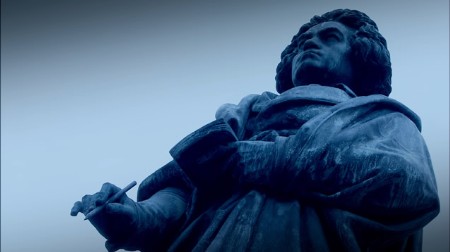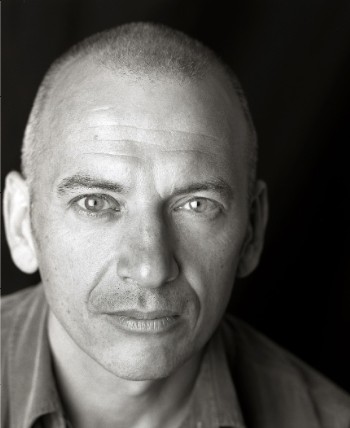Culture Vulture: In Search of Beethoven
Filled with great insights, musical and other, Phil Grabsky’s wonderful documentary on Beethoven depicts “a man of huge intellect and huge heart.”
In Search of Beethoven, a documentary by Phil Grabsky (UK, 2009, 139 min).
At the Museum of Fine Arts, Boston, MA, Wednesday Jan. 13 at 3:05 pm, Thursday January 14 at 5:10 pm., and Friday January 15 at 3:15 pm. Contact the MFA Film Box Office at 617-369-3306 or go here.

Ludwig Van Beethoven: He wrote music with eternity in mind.
By Helen Epstein
“If you were to pick 10 best things about humanity,” runs the voiceover at the opening of Phil Grabsky’s new documentary, “the music of Beethoven would be among them.”
Be that as it may, Ludwig van Beethoven didn’t seem to me the most promising subject for a new film on the frigid Saturday morning I drove to the MFA. But the English documentary filmmaker enjoys extensive word-of-mouth, based in part on his successful 2006 doc “In Search of Mozart,” and several nonmusical docs and, at 10:30, the auditorium was filled.
Grabsky serves as writer, producer, director and cinematographer of this excellent and exhaustive documentary. His method is straightforward. He begins with Beethoven’s birth in Bonn in 1770, avoids flashbacks and digressions, and ends 56 years later with the composer’s death near Vienna in 1827.
In following Beethoven’s solitary, sometimes glorious, increasingly bitter career, Grabsky blends meticulous research, an eye for interesting locations, an interest in close-ups of Beethoven’s manuscripts (including the original of the Eroica Symphony where Beethoven scratched out his original dedication to Napoleon so fiercely that he tore holes in the pages), judicious excerpts from his letters, long considerations of portraits, drawings, and etchings intercut with performances by singers, soloists, chamber groups and orchestras, and — best of all — interviews with an international series of musicians and Beethoven experts — with nary a music critic among them.

Filmmaker Phil Grabsky: One hell of an interviewer
As a former music journalist, I can only imagine the thousands of hours Grabsky spent filming the 100 interviews and 55 performances from which the documentary was culled and then piecing the segments together. Which of his many wry, intelligent and articulate interviewees to feature? Should he focus on their hands, faces, or words? Which part of the interview? Which piece of music? Which movement or phrase in it? Grabsky must be one hell of an interviewer. Every one of his interviewees seems to the point, delighted to be part of the project, relaxed, candid, humorous, and seemingly oblivious to the camera.
Out of this embarrassment of riches, Grabsky culls glimpses of various conductors including Roger Norrington, a string of pianists including Emanuel Ax, Helene Grimaud, and Jonathan Biss, string players, singers, musicologists, and social historians, each with an interesting take on performing Beethoven, on the difficulties and delights of Beethoven as a virtuoso pianist, ever-more revolutionary composer, self-indulgent sensualist, unrequited lover, troublesome tenant, imperious businessman, and demanding employer, living out his life against the background of the French Revolution and Napoleonic Wars.
Grabsky focuses on several aspects of the composer: his lifelong fiery, hedonistic personality; his virtuosity as a pianist following in the steps of Haydn and Mozart (several of the pianists ruefully note the difficulties in performing some of his passages); his negotiating the transition in patronage that occurred in the late 18th century when church and court were joined by wider audiences for music; his long, anguished struggle with deafness and simultaneous belief in the greatness of his work.
“Mozart was writing for Saturday,” Roger Norrington says in one of his succinct remarks, “Beethoven was writing for eternity.”
In one of the most dramatic parts of the film, Grabsky dramatizes the effect of Beethoven’s increasing inability to hear. During a well-attended four-hour winter concert of 1808, Beethoven performed in public for the last time, playing his Piano Concerto No. 4, which was “tailor-made for his own abilities.” That performance marked the end of his career as a soloist. Afterward, he became increasingly erratic in behavior, neglecting his personal hygiene, quarreling with family and friends, writing to friends “My servant has been quite different since I threw those books at her head” and “I am not at all well.”
The many experts from many countries interviewed share in gratifying detail their insights about and reactions to Beethoven. “He doesn’t care if an aria can be sung or not!” grumbles a hefty German bass. while a series of pianists take up the theme of Beethoven’s interest in the repetition of a single note and his ability to build musical dramatic tension in a way no previous composer had.
“In Search of Beethoven” might have benefited from being cut to two hours but, like his subject, Grabsky prefers even more to more. This documentary of “a man of huge intellect and huge heart” is big and filled with great insights, musical and other. Catch it while you can.
Here’s an interview with Phil Grabsky about his documentary.
————————————————————–
Helen Epstein is the author of “Music Talks,” a volume of 4000-word-and-under profiles of celebrated musical artists, including such stars as Vladimir Horowitz, Leonard Bernstein, violin teacher Dorothy DeLay, James Galway, and Yo-Yo Ma. The new edition is available online and at music outlets like the shop at Symphony Hall in Boston. Order through the link below to Amazon and theartsfuse receives a (small) percentage of the sale.
Tagged: Ax, Beethoven, Biss, Culture Vulture, documentary, Film, Grimaud, In Search of Beehoven, MFA, Mozart, musicians, Norrington

Dear Helen- you really are very kind! I am delighted you enjoyed the film. I’m just starting two more!! (Haydn and Chopin). I hope the interviewees are as good as those in Mozart and Beethoven. Very best wishes to you and your wonderful city. Phil Grabsky, Director.